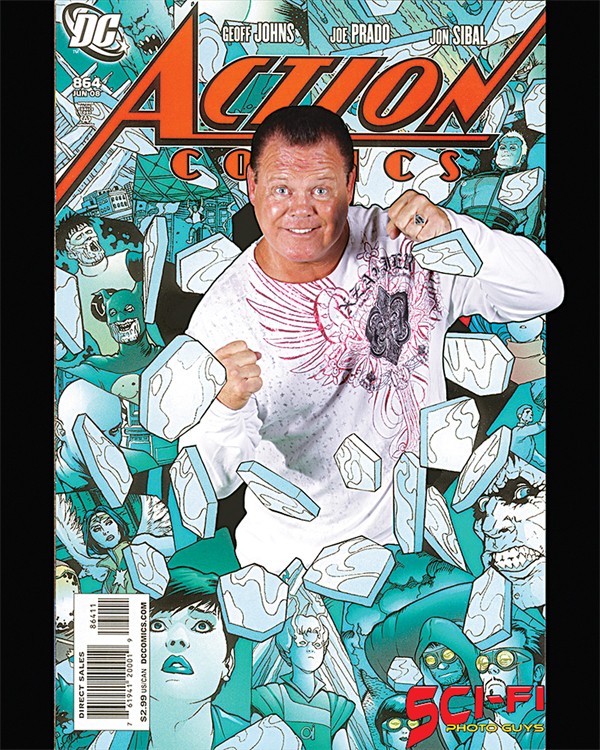Since a few dozen proto-geeks gathered for the first WorldCon in 1939, sci fi, fantasy, and anime fan conventions have grown into a huge phenomenon. Dozens of regional and speciality cons have sprung up all over the world, with 150,000 people gathering for Comic Con in San Diego and Dragon Con in Atlanta every year. Now in its 5th year, the Memphis Comic and Fantasy Convention has not yet achieved that level of success, but founder Joe Thordarson likes to think big: “I still have big plans for this. We want to grow every year.”
This weekend, the Hilton Memphis will play host to a few thousand people of all ages browsing through the wares of dozens of comics and collectables vendors, meeting some of their heroes, playing games, and generally letting their geek flags fly. “Even though the convention is basically a three-day geek celebration, when you walk through it, you can’t help but be struck by all of the talented artists, writers, and filmmakers,” Thordarson says.
“My goal from the beginning was to make it more than just a once-a-year event,” he says. “I wanted to make it a year-round thing and use the talented artists and filmmakers we deal with as a way to promote art in schools. Throughout the year, we host workshops and filmmaking camps and animation camps and things like that.”

One of the ongoing student projects is Live Cartoon.”We take a character created by one of the students, and then we write a script around it.” Students collaborate to create storyboards for the script, which are then projected behind voice actors who read the script live to a con audience. This year, Live Cartoon will be hosted by voice actor and host of That Anime Show J Michael Tatum. “It’s a neat thing for the kids,” Thordarson says. “It teaches them about what a real production is, it teaches them about deadlines. It hopefully gets them excited enough to go out and do it themselves.” The same program will include a sneak peek of Department of ReQuests, a pilot produced for the Cartoon Network by animators Travis Fowler and Krickett King, alums of both Memphis College of Art and previous Live Cartoon projects.
A series of Memphis-rooted films will screen at the con this year. Timid Monster will premiere their new short film After Light, a Kickstarter-funded science-fiction film that began life as a book trailer for Cameo Renae’s zombie apocalypse novel ARV-3 before growing into a fully realized short. “After Light takes a chapter out of the ARV-3 book,” says director Dan Baker. “A group of survivors who have weathered the apocalypse underground are trying to navigate their way through the city. They get lost and confused. Their map says they’re in the right place, but there have been barricades thrown up, which confuses them. So the young girl, the hero of the story, volunteers to climb to the top of a nearby building so she can get a bird’s eye view and scout ahead. So she and the male lead embark on a trip to the top of the building where they get ambushed by these zombie creatures called ARVs.”

The project had its genesis at Nashville’s Utopia Con, but Baker says he is looking forward to his hometown premiere. “Memphis Comic and Fantasy Contention is the con that we kind of cut our teeth on. We’ve been going there since 2011,” he says.
Geekland, director Lara Johnson’s documentary, was funded by the Rhodes College Institute for Regional Studies. “I grew up in Nashville, so I saw there was a conflict between traditional Southern culture and conservatism and geek culture,” Johnson says. “I had a friend in high school who is interviewed in the film whose father was a Southern Baptist pastor. She wasn’t allowed to read Harry Potter until she rebelled when she was 16. So I was going to see what that looked like in Memphis. But once I started getting into it, I found that it didn’t really exist in Memphis. People here are really cool about that kind of stuff, and there’s not really any conflict that you find in a lot of other places in the South. Memphis is unique in that way. So the film kind of turned into a showcase of all of the different, cool, geek things that are happening here.”
Johnson says making Geekland has introduced her to a new community: “The Memphis Comic and Fantasy Convention, along with a lot of other geeky people in Memphis, have totally embraced me.”
The evening will close with a screening of Mike McCarthy’s 2009 sci-fi film Cigarette Girl. Set in a dystopian future Memphis where tobacco is contraband, the Cigarette Girl, played by Cori Dials, must live by her wits and a handy .45.
“You combine Sexual Persona with Elvis Presley, and you get a great deal of my work,” McCarthy says of his art-house-meets-grind-house aesthetic. He calls Dials his “Gothic Brigitte Bardot.” “If you don’t quite have a million bucks, but you have somebody who looks like a million bucks, then you have a million bucks,”
